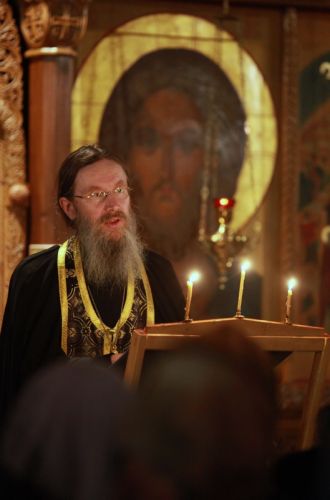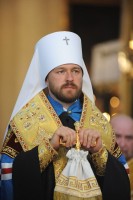 Today the Holy Church – and we all – has taken its very important first step into the mystical and penitential arena of Great Lent. Its first day has passed by and, following the reading of the canon of St. Andrew of Crete, our souls have been plunged into the deeply prayerful atmosphere of Great Lent.
Today the Holy Church – and we all – has taken its very important first step into the mystical and penitential arena of Great Lent. Its first day has passed by and, following the reading of the canon of St. Andrew of Crete, our souls have been plunged into the deeply prayerful atmosphere of Great Lent.
Glory to God that the Holy Fast has arrived! This is a time of struggle with the spirit of idleness, despondency, ambition, and idle talking – in the words of the prayer of St. Ephraim the Syrian, which we will be hearing for a long time, and which will penetrate deeply into our hearts.
Great Lent is an amazing opportunity for each of us, for each member of the Church, to break away from deadening vanity, from bustle and chatter, from the eternal pursuit of obscure ends. This is a time of battle with the multitude of enslaving passions, sins, and vices that nests in our hearts. When someone is in bondage to willful vanity and the spirit of the times, it seems to him (because he lives without prayer and grace) that God is somewhere far away and that the entire world is, as it were, woven from the icy particles of indifference and boredom. But we all know that we just need, if only for a minute, to stop ourselves – to turn aside, think, pray, and raise our hearts on high to God – and then we will immediately understand that God, His love and Eternity, are all amazingly close!
Great Lent is an opportunity for us all to put an end to our endless rushing about and to give some thought to Eternity. Great Lent, as the Holy Fathers call it, is an extraordinary expanse of love, goodness, mercy, and magnanimity towards our neighbors; it is an expanse of penitential prayer, contrition, and the remembrance of death. All these concepts are familiar to us, for we hear of them daily when we read the Holy Gospel and when the Church speaks of them to us.
But still, how can we ensure that our souls will truly possess everything that we read and hear? That it will not become a pious sham of the spiritual life, but real life? This, of course, is a very difficult task. But the fast has been given to us to help: it is a unique opportunity not to overlook ourselves, to take a small step towards our own souls. What should we do so that this amazing meeting of man with his own soul would take place?
If we look at our lives, which are often woven from moments of vanity and bustle, we can all ask ourselves: “Which is more important for me: seizing the moment for some new pleasure or new earthly discovery; or seizing the moment for acquiring eternal life?”
The Holy Church will always remind us – especially during these penitential, profound, mystical, and simultaneously joyful days – in the daily Divine services of the most important thing: of seeking the Kingdom of God in our hearts; of the necessity of acquiring the Holy Spirit, the Spirit of love, peace, and joy. This task is unusually difficult because it is easier for us to focus on the external, including during the fast: to focus on the menu, on giving up certain foods, television, or certain pleasures; on not going to places of entertainment, and so on. This is certainly important, but we should remember that this is not the deepest part of what we are doing.
St. Barsanuphius of Optina speaks wonderfully about monasticism. He has words on prayer, on the meaning and depths of the monastic life, that relate not only to monks, but to every layperson, to every believing Orthodox person. St. Barsanuphius says that outward monasticism can be likened to plowing the earth; but no matter how much you plow, he says, nothing will grow if you do not plant anything. Inner monasticism is the sowing, and the Jesus Prayer is the grain. Prayer illumines the entire inner life of a monk, giving him the strength for battle.
These words of St. Barsanuphius of Optina remind us of the inner component of the fast, of the most important thing: the sowing of prayer of which the Elder speaks. It helps the earth of our hearts to bring forth the grace-filled fruits of humility, meekness, inner mourning, and heartfelt prayer. St. Silouan the Athonite says that if you want pure prayer, then be humble and temperate, confess more often and more purely, and then prayer will love you.
Our Church is the experience of eternal life, which begins not on some abstract plane, but today – here and now in this particular human heart.
The Church returns a feeling of uniqueness, authenticity, and profundity to the life of a person who has become lost in this life, who has been fooled by false currents and ideas, of which there are so many in the world – a feeling that only faith, only Christ and the Church, can give.
The Holy Church gives us this fullness – these colors, this air, this light, this experience of profound feelings – right where God’s providence has placed each one of us, where we live, work, serve, and struggle; it is here that our souls grow into eternal life. No matter how many paths mankind may invent – new technologies, means of development, or new national ideas – there remains only one true path: the path of the Gospel, about which Christ Himself says: “Thou shalt love the Lord thy God with all thy heart; and thy neighbour as thyself.” Nothing in this world is more important, profound, or lofty than this commandment.
St. Justin [Popovic] of Serbia says that Christians should bear Christ’s luminous countenance into the twilight of the modern world, proclaiming it to the world that has grown lost in the wilds of self-love. The Gospel speaks of love for God and neighbor. Perhaps the task of every Christian is to bear Christ’s luminous countenance, about which the saint speaks. Of course, it is by no means necessary for the faithful to proclaim Christ with a megaphone in an open square or to accost our relatives, as we might often do, with the insistence that they immediately repent for their entire lives and go to church. Such preaching often does not bear fruit, because the best preacher is the believer who glows inwardly with love, magnanimity, mercy, inner peace, prayer, grace, and harmony. Of course, this is very difficult and we do not always manage to attain this inner glow, but nonetheless this is what the Church calls us to do.
After all, why does the world suffer? We see this suffering around us every day. Why does the unbeliever perceive this world as a catastrophe, as a leap into the abyss, as a total maze of boredom, despair, and indifference? Why does man consider himself the endpoint of this long earthly journey? He places himself, rather than God or truth, at the center of the universe and thinks that he is the ultimate goal of his own movement. Why does someone take drugs? Why does he fill his life with fantasies, rags, laughter, cynical pleasures, and deceit? Thousands of more things, which the person who has gone astray does not remember, stand behind these things. But most importantly, emptiness and the absence of God lie behind this, because every passion is the fruit of emptiness, the fruit of the lack of desire to move towards faith and God.
May our Lenten activity be repentance and contrition! May the people we meet on our life’s path – at work, on the train, in the subway, on the street – during Great Lent (which, of course, flies by), people who have lost their way, who know nothing of the Church or faith, feel at least some warmth and concern from us! May they see that there is another life, that these (as they said of Christians in antiquity) are a peculiar people who live differently! Of course, we do not live as did the first Christians, but may the people we meet still feel that different values and goals exist in this life!
How well St. Maximus the Confessor put it, that a Christian’s attitude towards the surrounding world should be neither passionate nor passionless, but compassionate! This compassion for the world should distinguish Christians. Our small Lenten good deed (and we should set such a task for ourselves) could be saying a small prayer for someone, offering someone a glass of water, or doing some other small good deed – let this be our mission, our preaching, our Lenten activity! But for this to take place, this ringing emptiness, this vacancy of grace and prayer, should not be in our hearts! Rather, those grace-filled gifts of which Holy Scripture speaks should be in the hearts of Christians: But the fruit of the Spirit is love, joy, peace, longsuffering, gentleness, goodness, faith, meekness, temperance [Galatians 5:22-23]. We all know that there are few such sweet-smelling fruits in our hearts; as we heard today in the canon of St. Andrew of Crete: “I have ruined the beauty of my mind” [Ode 2]. An amazing verse!
St. Nektary of Optina said: “Sure, things with me are bad; but with grace they are good.” What does this mean? With me things are entirely bad, but the Lord will help me; He will touch my heart with His grace – and help and support will certainly come. The most important thing is that we seek it, that we thirst for God. May Great Lent help each of us to find something new in the spiritual life! Of course, the most important thing is that we acquire repentance and learn patience, magnanimity, prayer, wisdom, and perhaps simple relations with our neighbors, that everyday wisdom that we often lack because our relations are often completely overshadowed by trivialities.
If someone is ill, but does not grumble, and understands that his illness, even if serious, has been given to him for the purification of his heart from a multitude of passions, then this experience of pain turns into one of recovery. If someone loses his loved ones, but sees in this Divine Providence rather than an accident, then this experience of loss turns into one of gain. If we encounter temptations, difficulties, afflictions, and unexpected crises that we had never before imagined – one can meet anything on life’s path – but all the while blame no one, neither God nor neighbor, but rather accept everything that happens with a pure heart, then our experience of everything in life will turn into thanksgiving to God and Heaven, which is wonderful, joyful, and very much needed by us.
Great Lent should not be something external for us. It is not a frown, but inner concentration; not turning down tasty fare, but turning down lack of love, condemnation, enmity, malice, dullness, indifference, and other passions that dwell in our hearts. Lent is a mirror in which we should, with the help of abstinence and repentance, see our hidden passions. The Prophet Isaiah says: And an highway shall be there, and a way, and it shall be called The way of holiness; the unclean shall not pass over it; but it shall be for those: the wayfaring men, though fools, shall not err therein [Isaiah 35:8]. Lent, upon which we have taken the first step today, is a very difficult way, but its goal is amazing, beautiful, profound, and very inspirational: Christ’s Pascha.
Optina Pustyn, 2011.
















